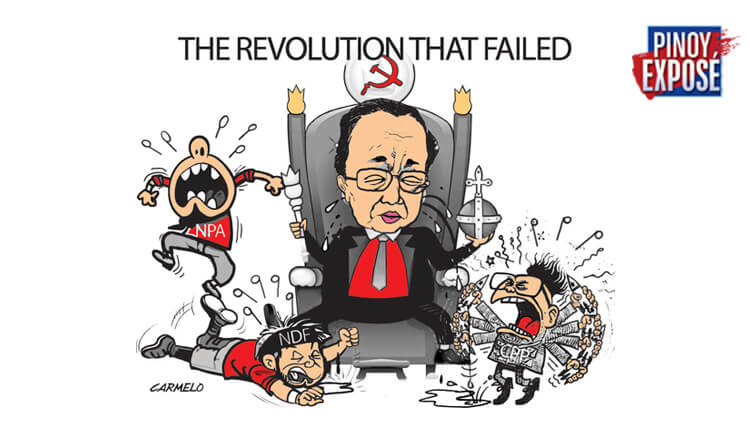The ‘war’ against communism is being won, but…
Special Report on the Second Congress of the CPP (Conclusion)/By: Pinoy Exposé Team
Editor’s Note:
WITH this edition, we conclude the special report on the Second Congress of the Communist Party of the Philippines, based on their own amended Constitution and Program. This party congress was held in the hinterlands of Surigao del Sur from October 24 to November 7, 2016.
They were among the documents seized by the government last March 13, 2020, from the possession of Julius ‘Ka Nars’ Giron, the elected CPP chairman in what would now go down in history as the ‘Surigao Congress.’
Giron and two of his companions were killed after “resisting arrest,” according to the official version of the government.
Pinoy Exposé endeavored to have this series published because, first, no other publication would touch on it and second, to help in the enlightenment of Filipinos on the history and essential nature of the CPP—an opportunist political party that has resorted to the use of arms and terrorist tactics (including deception) to gain political power and establish a dictatorship that would put to shame the martial law regime of Pres. Ferdinand Marcos from 1972 to 1981.
In the last issue, we gave way to a lecture given by historian, researcher and book author, Dr. Joseph Scalice that he delivered before an international audience (via YouTube) last August 25, 2020, at the Nanyang Technology University in Singapore.
Scalice has been researching and writing about the history of Philippine communism for the last 10 years and we hope the article added to the public’s understanding about the opportunist—and bloody—politics of the CPP and its founder, Jose Maria Sison.
THE end of the armed communist movement in the Philippines being waged by the CPP cannot be certain yet but already, there are many telltale signs that its influence is on the decline.
In the political front, the first major sign was the election in 2016 of Pres. Duterte—whom the CPP ardently supported—according to the research of Dr. Joseph Scalice, but which the CPP and Sison now vehemently deny.
The CPP and its long-time closet political allies from the country’s elite, particularly, the Liberal Party, may rant and conjure accusations against him one after another but what is clear is that, Pres. Duterte’s style of governance has stumped them time and again.
When Pres. Duterte cursed US president Barak Obama and other world leaders for interfering in the country’s domestic affairs, especially in the campaign against illegal drugs, the CPP’s cursing of US Imperialism suddenly sound hollow and empty of substance.
When Pres. Duterte cursed and ordered a review of all government contracts with the country’s oligarchs, the CPP’s condemnation of “class exploitation” by the rich also suddenly sound hollow and empty of substance; by his style of governance, Pres. Duterte has sent the message to Filipinos that genuine change—in our foreign and domestic policies—can be done without the need for armed struggle and an ideology anchored on the use of violence.
For at its best, the CPP’s ideology of Marxism- Leninism-Maoism, is an “ultra-nationalist” ideology aimed at the full development of the country’s economy. Look at what happened to the Soviet Union under Josef Stalin and to China after Mao.
“Proletarian internationalism” was immediately dropped in favor of national economic development.
The question, therefore is: Do we need this ideology in order to develop a “progressive and independent Philippines?”
The second indication was the 2019 midterm election where, for the first time since the partylist system was introduced in our body politic, CPP-led organizations failed to dominate the result.
The CPP should not be surprised if, in the 2022 election, it failed to capture any seat at all.
The third is the impact of the Internet and other modern means of communication. For the first time in decades, the CPP and its “legal democratic forces” in Congress (a term first coined by Jose Maria Sison), are finding it hard to dominate (and dictate) the narrative of events as their “version” can now be immediately refuted and discredited; the people’s access to all information in the World Wide Web has now made them more aware and cautious from immediately believing whatever the CPP says.
Public enlightenment is what would defeat the “allure” of Marxism-Leninism-Maoism, especially in the minds of the country’s youth.

Another important development is the creation by Pres. Duterte of the National Task Force to End Local Communist Conflict (NTF-ELCAC) in 2018, with the signing of Executive Order 70.
For the first time, the burden of defeating the over 50 years deception and aggression of the CPP no longer lies entirely on the shoulders of the Armed Forces of the Philippines but with the entire national bureaucracy under its ‘Whole of Nation’ approach.
Of course, critics would say that this series is all crap and nonsense because communist recruitment is as aggressive as before, what with so many students and the country’s youth still joining the CPP-NPA.
But what they failed to appreciate (or would not appreciate) is that for all their bravado, the CPP hierarchy is already a “dying breed;” most party veterans, the “first liners” who are seasoned in the art of war and mass politics are either dead, retired or in prison.
And in war, particularly, the CPP’s protracted war, a thousand recruits would mean nothing compared to the experience and knowledge of a single party “veteran.”
Indeed, the increasing number of NPA casualties are young, raw, recruits. This is an indication that the CPP’s armed struggle is not progressing at all, not by any measure. The CPP’s armed struggle has become the grave digger of the country’s next generation.
Sison would be turning 82 years old by February next year while the rest of the party leaders with him in the comforts of the Netherlands are also past their prime and are themselves just waiting to pass on to the ‘Great Divide.’
And with the death of Giron, among the last of the CPP’s “first liners” here, to whom can the CPP pass on the baton of leadership without worrying that inexperience—or incompetence—would result to its collapse, the way the Communist Party of the Soviet Union (CPSU) collapsed under Mikael Gorbachev?
The war against communism is being won in all fronts. But unless good governance has become a permanent fixture in the way government is run down to the village level, its influence would continue to linger much longer.
This is a drawback that we should all avoid.



